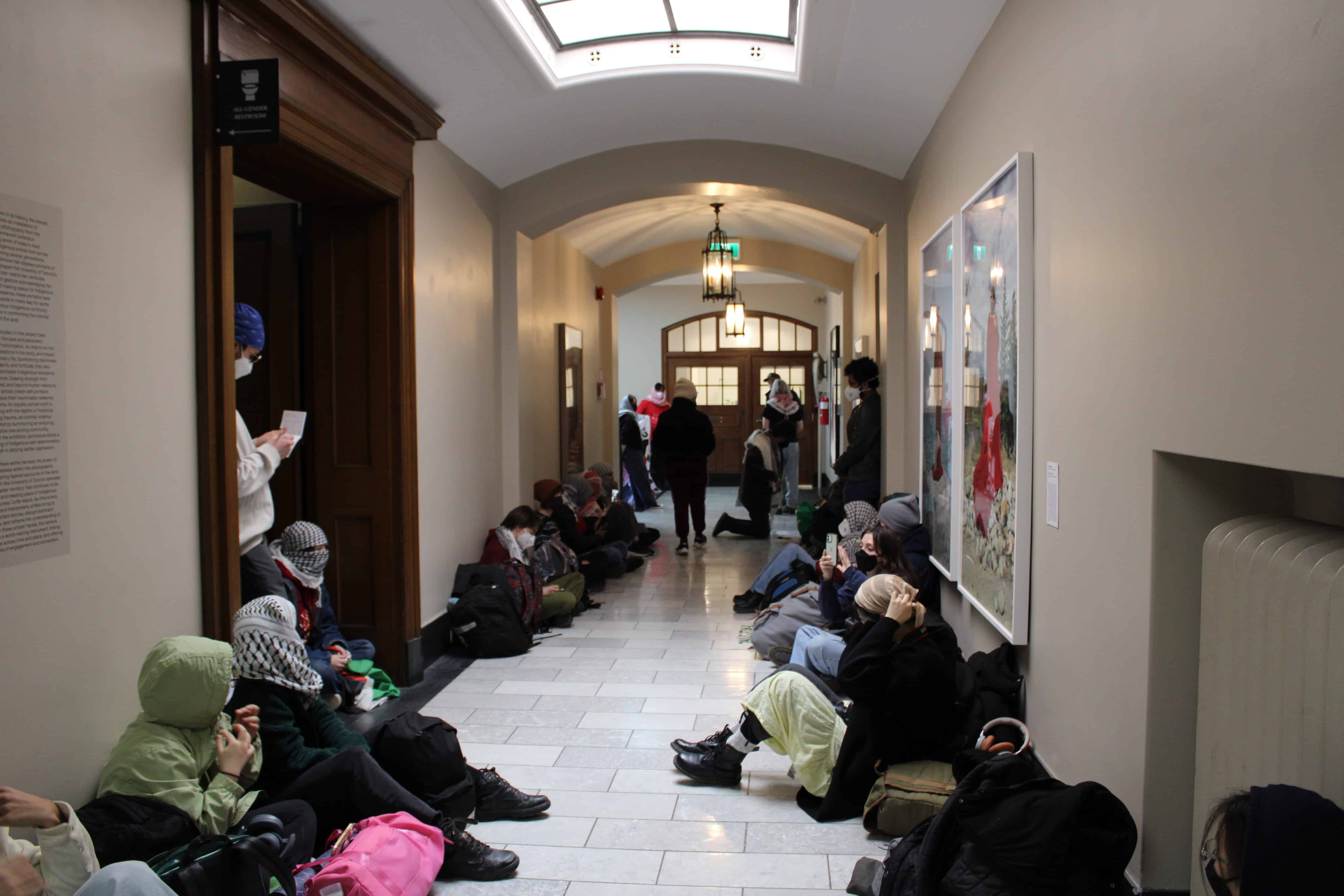The month of April opened with a group of students moving in to protest at Simcoe Hall.
Around 12 pm on April 1, a group of 26 students entered Simcoe Hall – the seat of U of T’s governance — and gathered outside President Meric Gertler’s office. The students posted signs directing staff to leave the building, and loudly declared that they planned to “occupy” the space. The group of students has secured a promise of a response from U of T admin, but 17 are planning to spend the night outside of President Gertler’s office in protest.
The group, which a participant identified as UofT Occupy for Palestine (O4P), concurrently released a statement on Instagram with three primary demands: that the university divest its endowment and pension plan from companies providing “military goods or services” to the Israeli government, publicly disclose the names of all companies that U of T invests in, and terminate all partnerships with institutions operating in or supporting settlements outside Israel’s internationally recognized border.
The protesters proceeded to sit along the hallway outside of Gertler’s office, on the second floor of Simcoe Hall. Holding signs and with a Palestinian flag hanging out the windows, the protesters chanted slogans like “Not a penny, not a dime, no more money for Israel’s crimes” and “Free, free Palestine.”
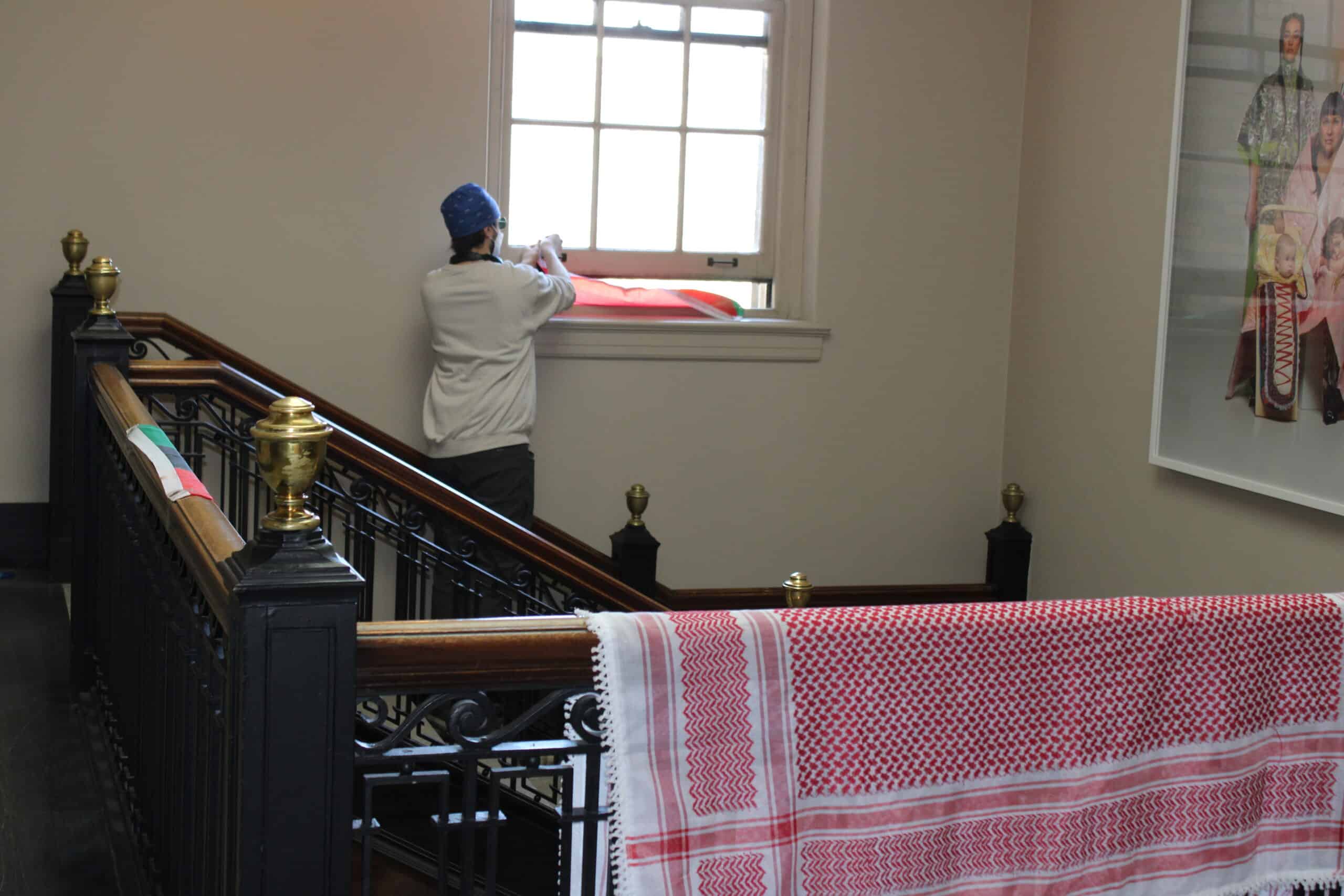
Students hung up Palestinian flags and keffiyehs, and displayed a flag from a second-story window. JESSIE SCHWALB/THEVARSITY
Campus Safety officers have been on and off the scene intermittently since the sit-in started, although U of T has agreed not to call in members of the Toronto Police Services unless protests escalate. According to one of the O4P organizers, Gertler was not present in his office when the protesters arrived, although other staff continued their work throughout the day.
Currently, Campus Security are not allowing any food or supplies into Simcoe Hall for the occupying students, and are not allowing any students to enter or re-enter the building. They have also refused repeated requests by The Varsity to bring in sleeping supplies for the reporter covering this story.
The university has not yet responded to The Varsity’s questions about why it has not allowed in food and whether it plans to continue this policy.
O4P also held a rally outside Simcoe Hall at 4:30 pm. Other student groups including Climate Justice UofT and Tkaronto Students for Palestine have made posts calling on students to join the rally. At the peak of the protest, around 5:30, around 50 attendees had gathered around the steps of Simcoe Hall.
Later in the afternoon, a few of the activists met with three university administrators: Vice-Provost, Students Sandy Welsh; Assistant Vice-President, Office of the President & Chief of Protocol Bryn MacPherson; and Vice-President & Provost Trevor Young. The three administrators agreed to take the group’s demands back to senior admin and respond sometime within the next week. Members of the group voted to continue the protest through the night.
In response to The Varsity’s request for comment, a U of T spokesperson wrote that the president had “delegated this matter” to the administrators with which O4P members met.
At 8:18 pm, Gertler also sent a letter to the protesters acknowleding that he’d received the group’s demands and requesting that they leave. In response, O4P sent an email requesting a meeting with Gertler.
“U of T, your hands are red”
This ‘occupation’ comes as the violence in the wake of October 7 enters its seventh month. In recent days, the IDF has continued bombing and military operations in Gaza. Israeli operations have killed more than 33,000 Palestinians in Gaza and in occupied territories in the West Bank since October 7, when militant group Hamas launched an attack killing over 1,100 people in Israel and taking 240 people captive.
At one point in the first few hours of the protest, students chanted “15,000 children dead.”
In its 2022 annual report, the University of Toronto Asset Management Corporation (UTAM) – the organization that determines how to invest U of T’s money — reported that it managed two investment pools totaling approximately $7.7 billion.
UTAM’s responsible investing policy states that the corporation will take environment, social, and governance factors “into account” when making investment decisions. These social factors include businesses’ impacts on human rights, their “activities in conflict zones,” and “controversial weapons.” In 2021, U of T committed to divest its portfolios from fossil fuels.
Aviral Dhamija, a fourth-year double–majoring in philosophy and international relations and a member of O4P, told The Varsity that the group’s demands specifically focus on military companies. “We’re targeting divestment especially just from any companies providing military goods or services, because this military clearly does not respect the boundaries of international law,” they said.
In December 2023, South Africa’s government submitted a case accusing the Israeli government of committing genocide against Palestinians. The court has not yet ruled on whether the Israeli government’s actions constitute genocide. On January 26, the International Court of Justice (ICJ) ordered Israel to take measures to prevent acts that would constitute genocide under international law.
The ICJ additionally ordered the Israeli government on March 28 to increase provision of humanitarian aid and water to prevent famine, noting the “prolonged and widespread deprivation of food and other basic necessities to which the Palestinians in the Gaza Strip have been subjected.”
The protesters chanted, “No investments on stolen land.”
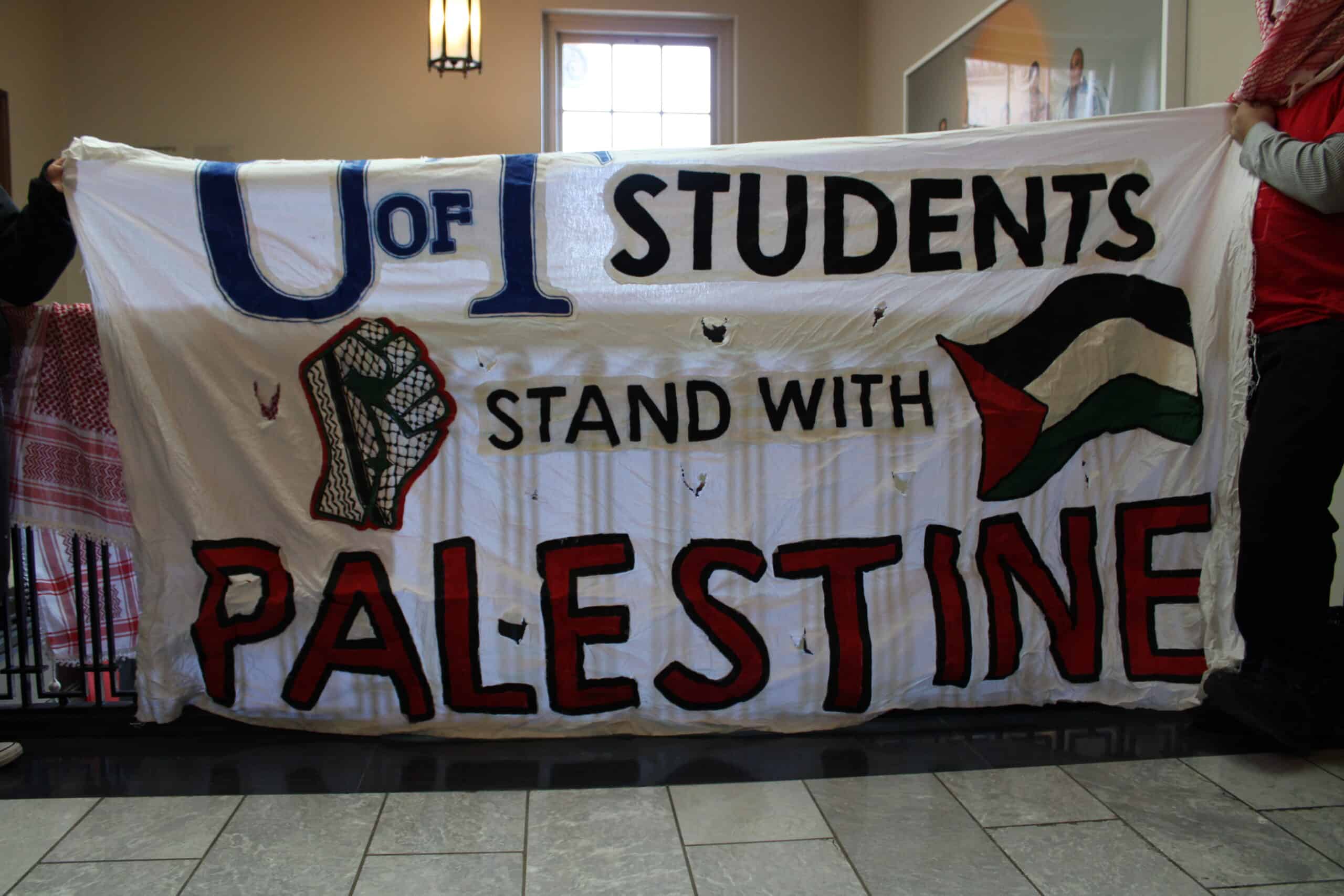
Students held a banner in front of the Simcoe Hall staircase. JESSIE SCHWALB/THEVARSITY
Dhamija stated that the group is looking for a commitment to meet these demands from Gertler, the University Affairs Board — the governance body responsible for non-academic matters — or from any other “high-ranking” governance bodies at U of T. The group’s Instagram post states that its members would alternatively accept a meeting with Gertler.
Dhamija noted the many protests and vigils held by activist groups across U of T in the past few months. “They’re ignoring everyone,” they said. “And if that’s the case, then we have to make ourselves heard. We have to take it to them. We have to make ourselves unavoidable.”
The occupation joins a history of sit-ins and student activism taking place at Simcoe Hall. In 2008, a group of students staged a sit-in in Simcoe Hall that ended in 14 students’ arrests.
Cutting ties with Israeli universities
O4P has also called on U of T to end partnerships with institutions that “operate in the Occupied Palestinian Territories, or sustain the apartheid policies, occupation and illegal settlement of these territores,” according to its Instagram statement.
Dhamija specified that the group wants U of T to break ties with the Hebrew University of Jerusalem, which operates buildings on land outside of Israel’s borders recognized under international law. They also pointed to Technion University, noting that researchers at the university have played instrumental roles in developing military technologies such as drones and bulldozers used by the IDF, and that Technion maintains partnerships with Israeli arms companies supplying surveillance equipment and missiles to the military.
Currently, U of T operates exchange programs with both universities. In 2023, U of T and Technion launched a collaboration focused on developing artificial intelligence for use in medicine. U of T and Hebrew University began an international fundraising campaign for their joint Research and Innovation Alliance in 2021. The program includes joint research in sciences and humanities and an entrepreneurship exchange program.
“That connection itself needs to be reevaluated,” said Dhamija. “Do we want to be sending our students, our postdocs, our faculty to a university that is currently… supporting what is happening to the people of Gaza?”
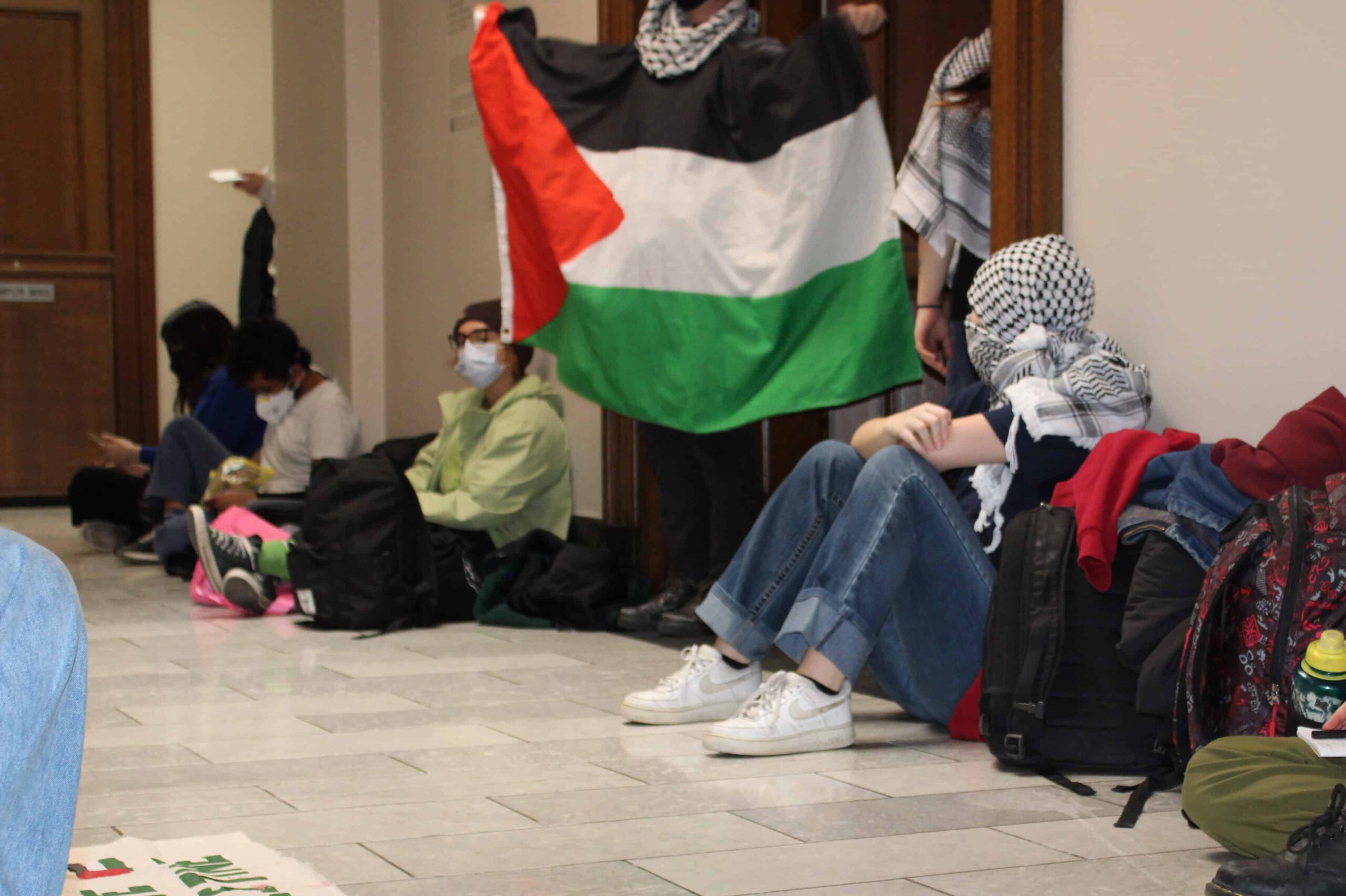
Protesters occupied the area outside of President Gertler’s office. JESSIE SCHWALB/THEVARSITY
U of T philosophy and comparative literature professor Rebecca Comay is a member of national organization Faculty for Palestine and the anti-Zionist Jewish Faculty Network, the latter of which formed at U of T in 2022. In a Zoom interview with The Varsity, she said that she and some members of Faculty for Palestine who she spoke with support the students’ demands.
She noted that if U of T cuts ties with these universities, that shouldn’t mean that U of T professors can’t collaborate with colleagues at those universities. “Individual faculty members who want to work with Israeli academics in a non-institutional way… [wouldn’t be] affected by this institutional uncoupling,” she said.
What comes next
Erin Mackey — a fifth-year student studying political science and environmental studies and a member of O4P — told The Varsity that administrators approached members of the group asking to meet at around 3:00 pm. Three students from O4P met with Welsh, MacPherson, and Young to discuss the students’ demands.
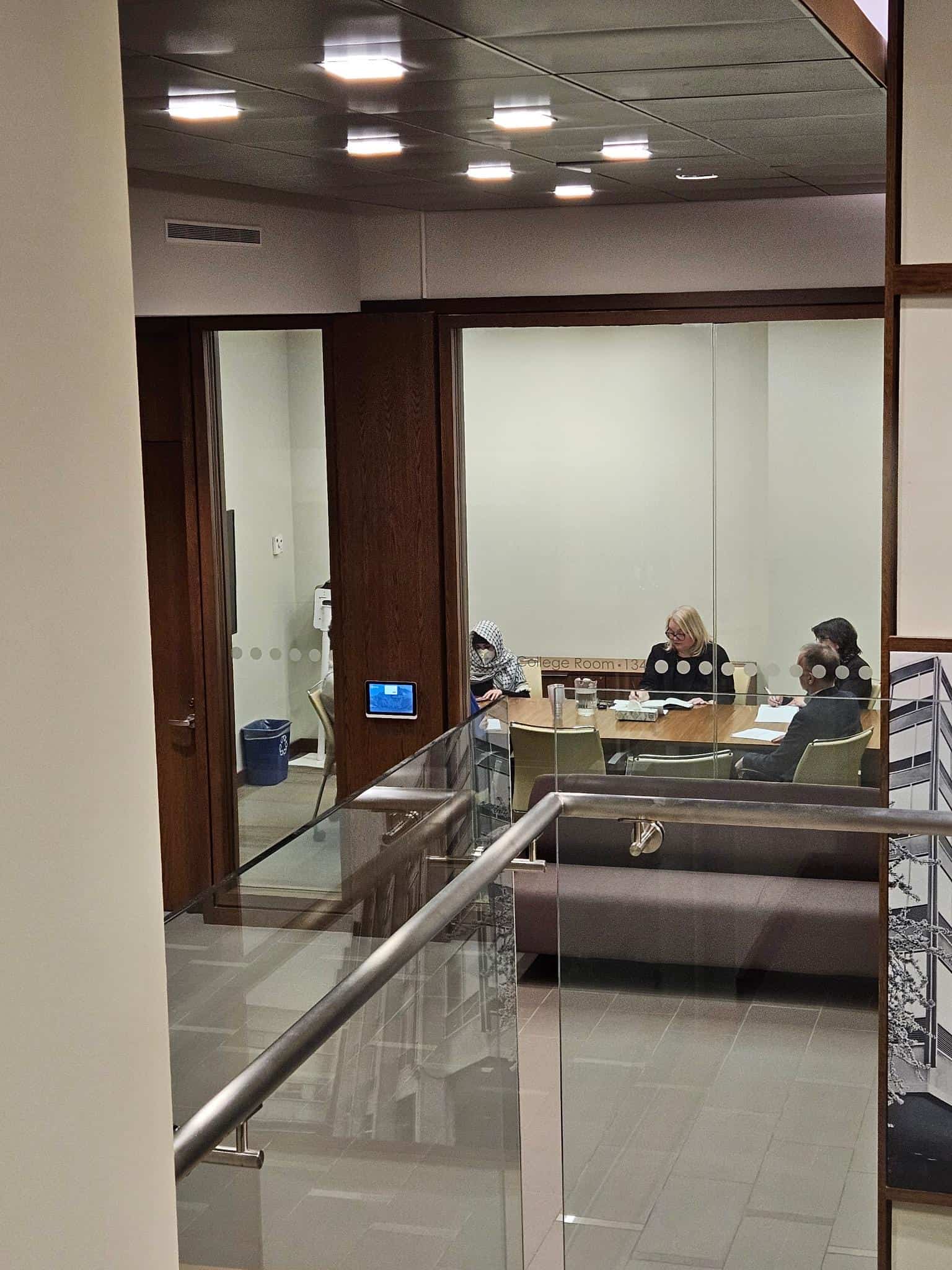
Students met with three members of U of T administration. COURTESY OF O4P
According to Mackey, the administrators did not agree to publicly acknowledge O4P’s demands but agreed to provide a private response acknowledging that U of T had received the demands that O4P could publicize. The administrators also committed to sending an additional response addressing whether it will take actions in response to the group’s demands in a week.
“By saying that they will privately acknowledge our demands, that tells me that they are not even willing to publicly defend their decision to continue to invest in weapons manufacturing and Israeli apartheid,” said Mackey. “If the university is going to continue to do these actions, the absolute bare minimum they could do is they could outline why — and they have yet to do so, because it is unjustifiable.”
At 8:18 pm, the president’s office sent a letter to the students acknowledging that the university had received the demands. “The team appreciated the opportunity to meet with you shortly after receiving your letter by email, and to hear your views about these pressing and distressing issues,” wrote Gertler. “As University leadership has now met with your representatives as requested, I would ask that you leave Simcoe Hall as you indicated you would in your letter.”
Mackey said that this meeting did not meet O4P’s demands because it didn’t include Gertler and the administrators present did not substantively discuss the demands, instead focusing on the university’s process for raising concerns and when the students were going to leave.
“We will continue to occupy the space as long as we see fit, and whatever happens next, we are still deciding and discussing,” she said. She also clarified that the group will decide whether to continue the protest through April 2 at a later time.
By the evening, most of the protest outside on the steps of Simcoe Hall had dispersed, but some protesters were still gathered around the entrance. An organizer told The Varsity that people had signed up to stay outside the building for the duration of the occupation.
In the early hours of April 2, O4P sent an email response to Gertler. The students asserted that they want to speak with Gertler directly sometime that day because of his experience and position on the board of UTAM. “We would like this to be an in-depth conversation about the content of our demands, that outlines clear steps towards meeting them. We hope this will be the first meeting building towards a sustained dialogue between students and administration on this issue,” the email reads.
“Solidarity”
Marianna Reis — a ninth-year anthropology PhD student — is one of the individuals participating in the sit-in. Reis is the communications and recording secretary for the Canadian Union of Public Employees 3902 Unit 1 — which represents students employed as academic workers at U of T — but said she represented herself, not the union. She told The Varsity that she believes in the importance of students and workers across political movements standing “in solidarity with each other,” even when their struggles aren’t exactly analogous.
“There’s so many huge institutions that are financially benefiting from what’s happening, or are otherwise complicit, because they’re unwilling to cut ties with companies that are directly profiting from genocide,” Reyes said. “There needs to be some sort of escalation in order for people in power to know that we are serious in our demands and that we have a lot of power behind our demands.”
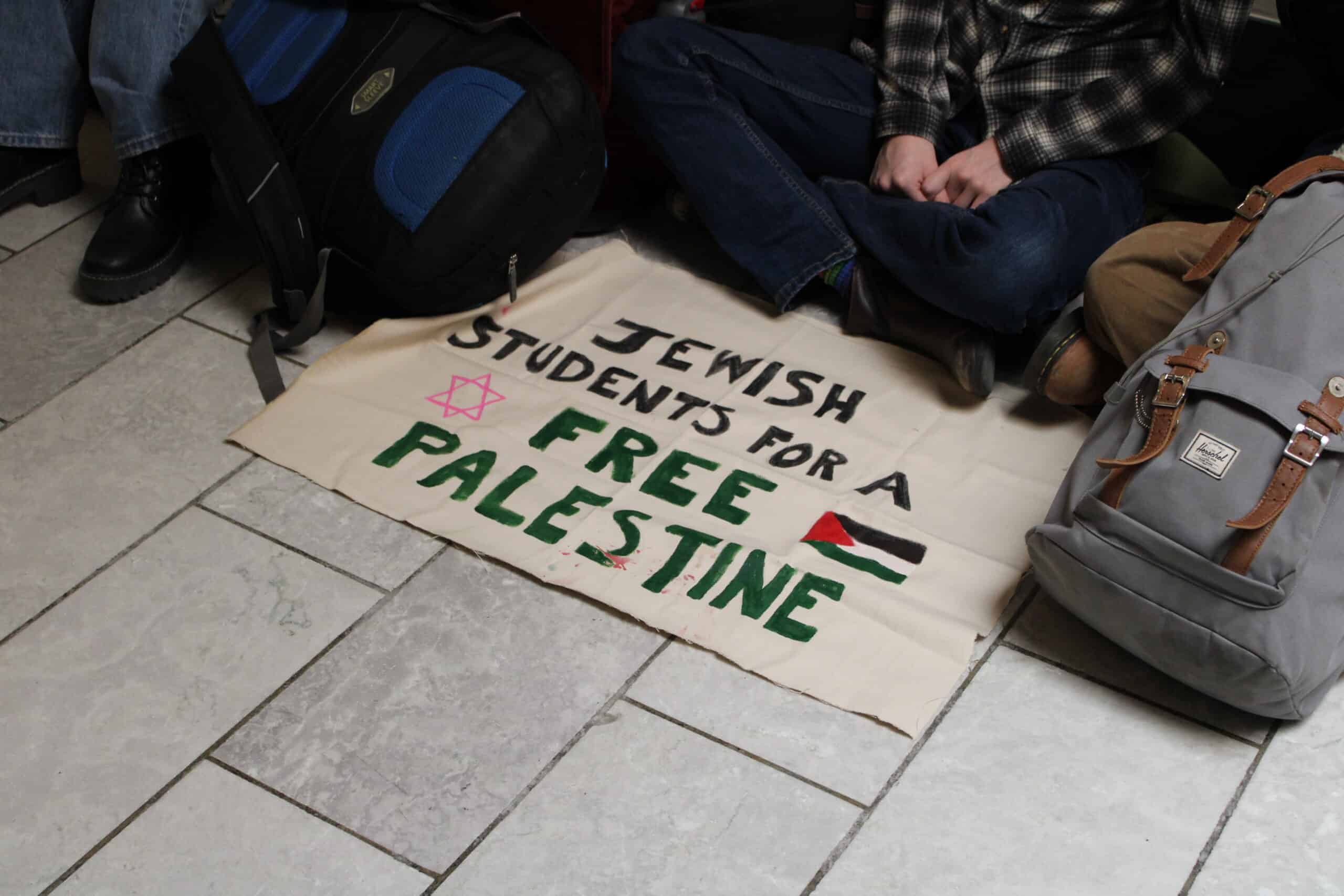
Twenty-six students participated in the protest, and brought in banners and flags. JESSIE SCHWALB/THEVARSITYComay noted that the demands made by the students are aligned with other demands that have been made worldwide. Also on April 1, students at Western staged a protest outside Western President Alan Shepard’s office, demanding that their university divest its endowment from companies supplying the IDF. Students at Brown University and the University of Michigan have also staged protests in the past few months calling for divestment.
“They’re not the nominal demands of a few eccentric students,” said Comey. “This is a mass movement that these students are part of… and the demands themselves are critical.”
This story is developing. More to come.
With files from Selia Sanchez and Eleanor Park.
Editor’s note (April 1, 4:21 pm): This story has been updated to include additional photos.
Editor’s note (April 1, 7:31 pm): This story has been updated to include details about the rally outside Simcoe Hall, as well as negotiations between activists and U of T. It also now includes comment from Professor Rebecca Comay. A previous version of this article also mistakenly said that there were 24, not 26, students participating in the sit-in.
Editor’s note (April 1, 9:36 pm): This story has been updated to include comment from a U of T spokesperson and to reflect that the group updated its title to U of T Occupy for Palestine instead of Coalition of Concerned Students.
Editor’s note (April 1, 10:51 pm): This story has been updated to reflect Gertler’s response and additional information about the rally.
Editor’s note (April 2): This story has been updated to include O4P’s response to Gertler’s letter.

